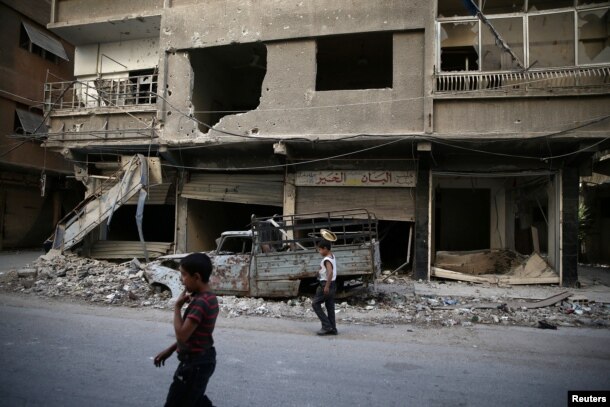
Attack on Aid Convoy in Syria May Have Destroyed Cease-fire Deal
VOA News
Steve Herman
NEW YORK — A big blow was dealt to efforts to bring about peace in Syria when aid trucks trying to reach besieged Aleppo were hit in an airstrike Monday.
The attack almost certainly has destroyed the one-week cease-fire negotiated between the United States and Russia, according to observers.
«We don’t know if it can be salvaged,» a senior U.S. official told reporters Monday evening.
«I call on all parties to the conflict, once again, to take all necessary measures to protect humanitarian actors, civilians and civilian infrastructure as required by international humanitarian law,» said U.N. Undersecretary-General for Humanitarian Affairs Stephen O’Brien.

FILE – Children walk near damaged buildings in rebel-held Ain Tarma, eastern Damascus suburb of Ghouta, Syria, Sept. 17, 2016.
Earlier in the day, the Syrian military declared the cease-fire over, contending U.S.-based rebels had repeatedly violated it.
U.S. Secretary of State John Kerry said only Washington and Russia, the architects of the latest attempt to halt hostilities in Syria, could declare the cease-fire at an end, not Damascus.
«So we need to see what the Russians say, but the point, the important thing, is the Russians need to control [Syrian President] Assad who evidently is indiscriminately bombing, including of humanitarian convoys,» Kerry said to reporters as he entered a meeting in New York with Saudi officials.
Coalition strikes
There was never any real cease-fire in place to ascertain success or failure, said former Syrian Prime Minister Riyad Hijab, who heads the moderate opposition’s negotiating committee.
The attempt to keep in place a widespread cessation of hostilities deteriorated quickly after a U.S.-led coalition airstrike Saturday near Deir al-Zor airport that Moscow and Damascus claimed killed dozens of Syrian soldiers.
Monitors said subsequent airstrikes, presumably conducted by Syrian or Russian military jets, struck opposition neighborhoods in Aleppo.
A member of the U.S. Senate’s Intelligence Committee says the cease-fire was bound to fail, as it was too one-sided in favor of Russia and its Syrian ally.
«I obviously hoped it would work,» Senator Susan Collins, a Republican from the state of Maine, told VOA. «I still don’t understand why we’re not trying to drop humanitarian supplies and relief to the people in Aleppo and other areas where people literally are starving to death.»
The nationwide truce in Syria was announced by Kerry and Russian Foreign Minister Sergei Lavrov in Geneva on September 10. It went into effect two days later, intended to clear the way for humanitarian aid access.
‘Doomed from start’
A significant reduction of violence for one week, accompanied by the delivery of aid, was to clear the way for the U.S. and Russian militaries coordinating separate airstrikes against the jihadist Nusra front, as well as the so-called Islamic State group. And when those initial strikes occurred, under the agreement, the Syrian air force was then to cease its attacks.
The cease-fire’s collapse is «déjà vu from the last failed cessation of hostilities experiment this past February,» said Jessica Ashooh, deputy director of the Atlantic Council’s Middle East Strategy Task Force. «While the goal of trying to pause the fighting for humanitarian deliveries was a worthy one, without any enforcement mechanism, it was doomed from the start.»
«Opposition forces were rightly skeptical of the arrangement and had little incentive to trust the terms of the cease-fire,» she told VOA. «The end result is that the U.S. now has less leverage than ever — if it ever had any over the non-extremist opposition fighters on the ground.»
Ashooh and other analysts predict any future diplomatic efforts will be more difficult, if not impossible, for the remainder of the current American presidential administration unless there is a significant change in policy giving the moderate opposition a reason to cooperate with the United States.
They also forecast a quick return to fighting in Syria at peak levels.
«As with before this latest short-lived cease-fire, Aleppo will almost certainly prove to be the most intense area of battle, with both sides determined to fight as if it were their last day,» Charles Lister, senior fellow at the Middle East Institute, told VOA. «Yet again, our half-hearted approach to the crisis in Syria has done nothing but provide a brief pause to the fighting, so that all those actors involved can simply start again.»
VOA’s Michael Bowman and Nike Ching in Washington, Carla Babb at the Pentagon and Margaret Besheer at the United Nations contributed to this report.

